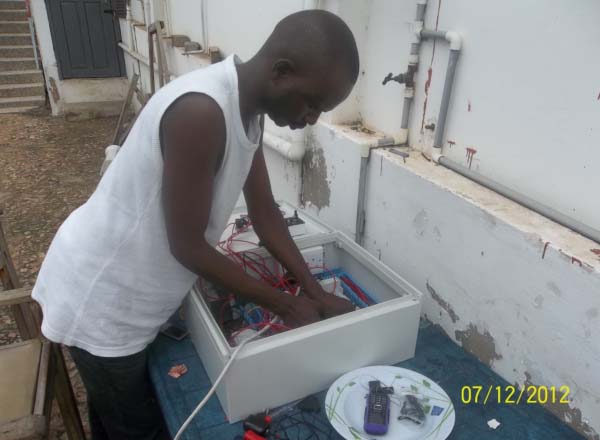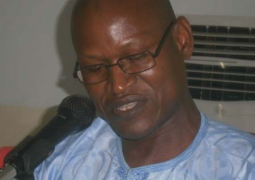
If he were born at the time of the shift from agrarian period to industrial revolution, he definitely would have been likened to earliest known inventors like Alexander Graham Bell, Samuel Morse and so on, whose ardent desire to search for knowledge and innovation has today changed the lives of billions of people around the world. The uses of man’s creative knowledge in inventing telecommunication as was done by Graham and telegraph by Morse, has today virtually connected the world’s billions, making life easier by phasing out services like horse-style system of delivering mails under Pony Express Services in the United States.
Gambia’s Ndongo Sillah, a mere drop-out driver in 1993 when he joined the nation’s utility giant, probably had no idea how far technology could be explored to make life changing impacts on the lives of the people. The young determined man was just employed as a happy driver, running the errands of the top elites at the apogee of leadership of the now National Water and Electricity Company (NAWEC). But all along, Sillah always believed that he was on the wrong cause – that there was something crucially missing that he ought to unearth with all sense of vigor and commitment. Realising that he was just more than a driver dropping and picking so-called learned officials, he began a critical soul-searching of what best he could make out of himself. Seeing education as a tool to unearthing the missing talent, the young wasted no time but to make serious steps towards exploring his full potentials. He vividly remembers on a fateful Sunday when he formally pronounced to the then Finance Director of NAWEC (Alagie Jobe) his desire to develop his skills at a technical training center.
That decision would become the most significant step he has made in his life. After series of educational training that spanned over a decade (from 1997 to 2013), Sillah is a success story and a source of inspiration for many a people. Not only has he broken the stereotypes and the apparent vicious cycle surrounding people of his nature, today, he boasts of an established engineer who wears the cap as the first ever staff of the nation’s utility giant to have developed from his campus bedroom in a Ghana College, a mobile technology capable of remotely switching on and off a borehole.
In this exclusive feature by Afropse.se’s Hatab Fadera, Sillah, who was caught up at his Brikama office, shares his intriguing story of a life journey that can only spur the younger generation to follow his footsteps if leapfrogging the country’s development cause is anything to go by.
He narrates: “Going up and down as a driver, I realised that I had more to offer. Thus, I seriously began thinking of furthering my education. I had always wanted it before but due to family background I couldn’t. So luckily one day our Finance Director (Alagie Jobe) at the time assigned me to Dakar, Senegal on an official mission. When I returned, he gave me D1000 for me to keep. But I told him that I didn’t want that money, that all I needed was for him to help me further my education. He promised that will be taken care of and insisted I should take the money. But I also insisted I won’t take it; that I needed only education. He asked if I was serious and I replied in the positive. He then asked me to go and look for a school and get back to him. I did everything and returned to him….This was in 1997. They paid for me a certificate programme at the Gambia Technical Training Institute (GTTI) in electrical and electronics and I started from 1997 to 2000. After completing this programme, I was transferred from driving to maintenance department where I would work for a period of five years. Afterwards, I was sent to Chamen Technical Training School in Jeshwang where I did my advance diploma in installation as well as power. I finished that programme in 2009”.
The opportunity for Sillah to further explore the limits of his capacity presented itself in 2010 when he was selected to be among a batch NAWEC was to send to Ghana Polytechnic College for a Higher National Diploma training programme in electrical and electronics. For him, this was all he needed given that the programme was to challenge each of them to come out with a meaningful project at the end of their three-year spell at the college.
The road to device development
He adds: “It was a requirement to do projects that may benefit people around the world. So when it was time for such undertaking, my head of department called me to ask me to take one of the existing projects left by our seniors. But having coming from a company where I accumulated a wealth of experience, I decided to design and create my own project instead of improvising on the existing ones. I also realized that 99 percent of our water supply comes from boreholes, which are situated at different locations in the country. So whenever light goes on or off, you have to drive back and forth to those places to either switch off or put on the machines. This costs NAWEC millions of dalasis each month. So I said before taking up someone’s project, let me create mine to see how best my knowledge and invention can help NAWEC cut cost. I believe that the use of technology is the ultimate solution to cutting cost. Writing memos or controlling vehicles and so on are not the real solutions. So I asked what I could do to help the situation. So I thought of developing a mobile phone technology whereby I can use the mobile phone to switch on and off the boreholes when the need arises even from my office. This way, it will be practical in cutting cost and save NAWEC millions incurred in running such things.”
Using stipend for the project
Whilst this sort of investment might sound capital intensive, it only cost Sillah D60, 000 to complete. As a determined student looking forward to breaking a record, he didn’t wait to be sponsored. He voluntarily cut his stipend by halve to invest on his project knowingly fully well that the end result will justify the importance of such a sacrifice.
“I engaged myself in research and finding the electrical components and for designing. So I was able to do my research, buying things and designing my circuits. Sometimes I will design and it will fail. So but after a time, luckily it worked. I tested it in my room; used it to put on and switch my light; used it to put on my music; and I would put on my fan at home from school before closing. So I was testing it for a while. It wasn’t like I was doing it at school, no I did everything at home. I virtually did in my bedroom. When I finished that project, I then moved to the school to test it with my HOD. So fortunately, there was this polytechnic week in Ghana where they showcased talents and innovations. This happens in all regions of Ghana. So for that year there was no existing new project that they could take to this week. So the Polytechnic Engineering Student Association (PESA) was informed by my HOD about my finished project and asked them to take it to the week. We went to the week and amazingly, my project came out “the best”. The fact that I was a foreigner made it all interesting. It was aired on Ghana national television and I was happy about that. So when we came back I received a lot of compliments from colleagues and school staff,” Sillah, who hails from Sunbumdu village in Kabada, Lower River Region (LRR) asserted.
Back home
Back home to The Gambia, Sillah’s dream of inventing a technology for the nation’s utility giant apparently came as a dream come true. He believes that with this creation, NAWEC can now practically cut cost in its operations that run in millions each month. With a click of a button, he said, a borehole can be either remotely switched off or on.
“Just imagine the fleet of operational vehicles NAWEC has that take each a full tank every Monday. These are the vehicles deployed to switch on and off boreholes every other day. Now imagine with just a click of a button, you can switch on and off the boreholes from your office. This obviously is saving lots of revenue. I know it can save NAWEC millions of money every month. NAWEC really supported me on this project. In fact they refunded the amount I spent on this project,” he told me.
The next challenge
Now the next challenge before Sillah is to lead a team to pilot a project that will have a set of up to 13 boreholes to be run and managed through his mobile phone technology. The proposal is already developed and is sent to NAWEC management for actions. He hopes that the project will start soon.
“I want to say that if you want to contract this kind of project outside it will cost millions of money. And whenever there is a problem you have to call them back to fix it, which is an additional cost. So if you have local expert that designs and builds it here, that is way cheaper and sustainable,” he remarked.
“The device is in pairs; and each must have a normal sim card. So it’s like a network and can cover as long as the network can. You can be here and switch a borehole in Basse if the network can cover. But it takes a creative mind to invent. The knowledge you have must be applied with greater skills and innovation to be able to create something new,” he said.
Concern
But Sillah’s biggest concern is not about how to make more inventions of such projects, but the apparent lack of support to not only for himself, but to the creative Gambian talents. Not only has he felt “underutilised”, but lacks the necessary empowerment needed to hone his skills in a sustained manner. He believes that if people like him and others are supported the way it should have been, it will benefit all sectors of the country’s economy.
He adds: “For instance, the police will enjoy it. How? We can design and build these traffic lights that you are seeing. There are enormous Gambians with abundance of talents and they can do amazing things when the support is provided. For instance while I was in Ghana, after inventing my technology, there was a man who approached me and said he works at a Toyota motor garage and have had enormous issues relating to cars. He asked if I can create something that will ensure that if anyone takes another person’s car in his absence, when he calls the vehicle it will switch off. I said to him before allowing a vehicle to take off, the person should not be able to start the vehicle in the first place unless you call the number of the vehicle owner. So I designed and built it for him. We tested it at his garage; you cannot put that vehicle on unless you call the owner’s number.”
The engineer said he has The Gambia and its development at heart, but lamented the lack of support for creative minds like him. He vowed to do all he can through his skills to complement the various development visions and targets of the government in its push for an accelerated economic growth. But for that to happen, he gently concluded, “I want to be put in real task by giving me problems to solve”.


